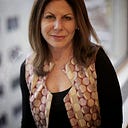World Immunisation Week — Ordinary Women Doing Extraordinary Things
Immunization has proven to be one of the world’s greatest health care interventions of our time, saving millions of lives annually. Yet we know that many children needlessly miss out on the vaccines they need to stay healthy and thrive into adolescence and beyond. Adults, too, fail to get needed and wanted vaccines, including those used to combat COVID-19. One reason has to do with the lack of robust delivery systems, the most effective of which, it turns out, are women.
Even before the global pandemic took hold of our lives and livelihoods, women were on the frontlines of vaccinating and supporting at-risk, remote and conflict-affected populations. As the world’s leading caregivers and care workers, women have been the ones to pick up the pieces of shattered lives, find food, build new shelters and care for the children. It’s what women around the world do best, doing what they have to do to survive, and to enable their families and communities to survive. And yet their role in health care delivery, whether formal or informal, is often overlooked.
Female community health workers in Mali, for example, are helping entire generations to grow up strong. They are trained to spot and treat malnutrition as well as encourage village children to visit local health clinics for immunisations. In Northern Kenya, where Al-Shabaab has forced the shutdown of health facilities close to the dangerous Somalia border, a group of women are leading the charge to ensure COVID-19-vaccines reach the most vulnerable. House-to-house, person-to-person, these female caregivers turned activists are risking their lives to protect others, leading community education campaigns and involving elders to make the case for mass vaccinations.
Closer to home, dozens of Orthodox Jewish women in New York City have begun working as E.M.T.s to assist other Orthodox women in distress. The volunteers from Ezras Nashim, which in Hebrew means “assisting women”, help with everything from childbirth to burn victims, often arousing the ire of men in these highly traditional communities.
Time and time again, women health workers are delivering vaccines and working to overcome barriers to health access, with little to no support. We can change that by investing in fair pay, decent working conditions and better support systems and networks for females on the frontline.
These ordinary women are doing extraordinary things every day to better their families and communities. They deserve not only our respect and recognition but also to be treated equitably.
Karen Sherman is the president of Akilah, East Africa’s preeminent institute for women’s higher education, leadership and career development, and the author of Brick by Brick: Building Hope and Opportunity for Women Survivors Everywhere
